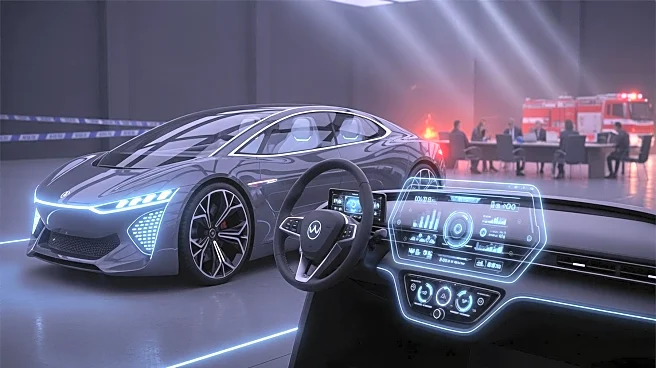What's Happening?
General Motors has announced that the Cadillac Escalade IQ will be its first SUV equipped with Level 3 autonomous driving technology, set to debut in 2028. This advancement allows drivers to take their hands off the steering wheel and look away from the road
under specific conditions. The announcement was made by GM President Mary Barra at the GM Forward event in New York, where the company emphasized its commitment to automation, artificial intelligence, and advanced electrical technology. Despite challenges such as a slowdown in electric vehicle production and the loss of tax incentives in the U.S., GM remains focused on innovation. The Escalade IQ will utilize cameras, radars, and LiDAR sensors to create a detailed reading of the environment, enabling autonomous driving. This technology represents a significant leap from GM's previous Level 2 automation systems, such as Super Cruise, and positions GM ahead of competitors like Tesla.
Why It's Important?
The introduction of Level 3 autonomous driving in the Cadillac Escalade IQ marks a significant milestone in the automotive industry, potentially transforming the driving experience. This development could enhance safety and convenience for drivers, allowing them to engage in other activities while the vehicle navigates autonomously. For GM, this move reinforces its leadership in automotive innovation and positions it as a frontrunner in the race towards fully autonomous vehicles. The broader impact on the U.S. automotive market includes potential shifts in consumer preferences towards more technologically advanced vehicles, influencing industry standards and regulatory frameworks. Additionally, GM's commitment to integrating AI and automation could drive further advancements in vehicle technology, benefiting consumers and setting new benchmarks for competitors.
What's Next?
As GM prepares to launch the Cadillac Escalade IQ with Level 3 autonomous driving, several steps are anticipated. The company will likely focus on obtaining legal approvals for autonomous driving in various U.S. states, as current regulations vary. GM's ongoing development of AI-powered interfaces and collaborative robots in its factories suggests a continued investment in technology that supports autonomous driving. The planned GM Energy Home System, which uses electric vehicle batteries as a domestic energy source, is set for 2026, indicating GM's broader strategy to integrate vehicle technology with sustainable energy solutions. These initiatives may prompt responses from competitors, potentially accelerating innovation across the industry.
Beyond the Headlines
The introduction of Level 3 autonomous driving by GM could have deeper implications for the automotive industry and society. Ethically, the shift towards autonomous vehicles raises questions about liability and safety standards, necessitating new legal frameworks. Culturally, the adoption of hands-free driving may alter perceptions of driving as a skill and change the relationship between humans and vehicles. Long-term, this technology could contribute to reducing traffic accidents and improving road safety, while also influencing urban planning and infrastructure development to accommodate autonomous vehicles.















